The Path to Climate Justice Is Intergenerational
And this team of Brooklyn-based grassroots activists helping to hold the world’s five largest investor-owned fossil fuel producers to account isn’t easily intimidated.
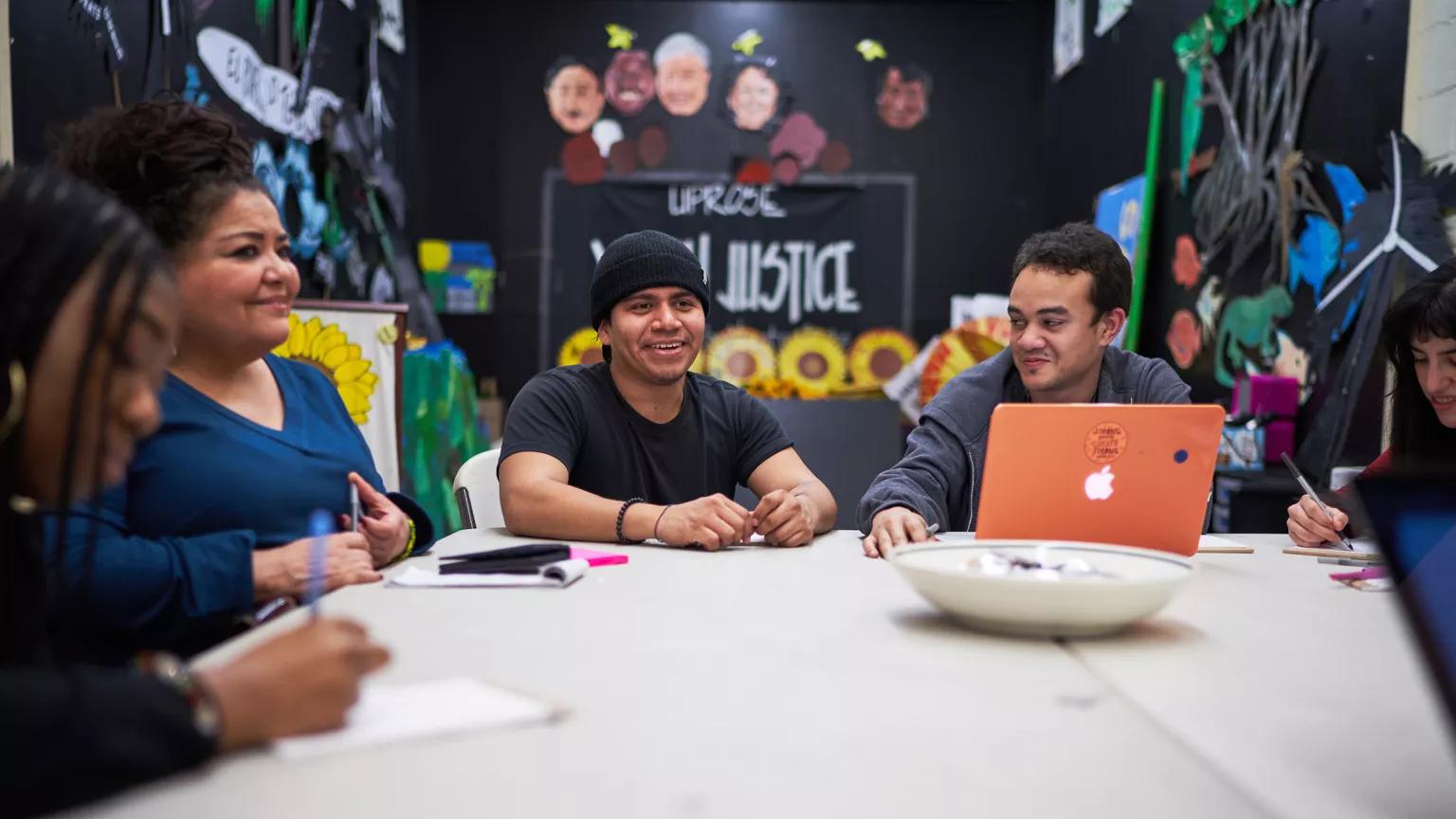
UPROSE executive director Elizabeth Yeampierre (second from left) and other members of the organization
Michael Rubenstein for NRDC
Soon after Elizabeth Yeampierre became the executive director of UPROSE, Brooklyn’s oldest Latino community–based advocacy organization, a teenage girl walked into its storefront office in the Sunset Park neighborhood and asked what the group did. Yeampierre, spotting an opportunity, turned the question around and encouraged the visitor to tell her what she wanted to see happening. Her answer was clear: Someone in the waterfront neighborhood needed to address environmental issues.
The organization, which was founded in 1966 by Puerto Rican activists, had long been involved in addressing equitable neighborhood development on behalf of this largely working-class community of color, which includes a mix of Asian Americans and Latin Americans. But fighting pollution and advocating for sustainable living had rarely been a primary focus.
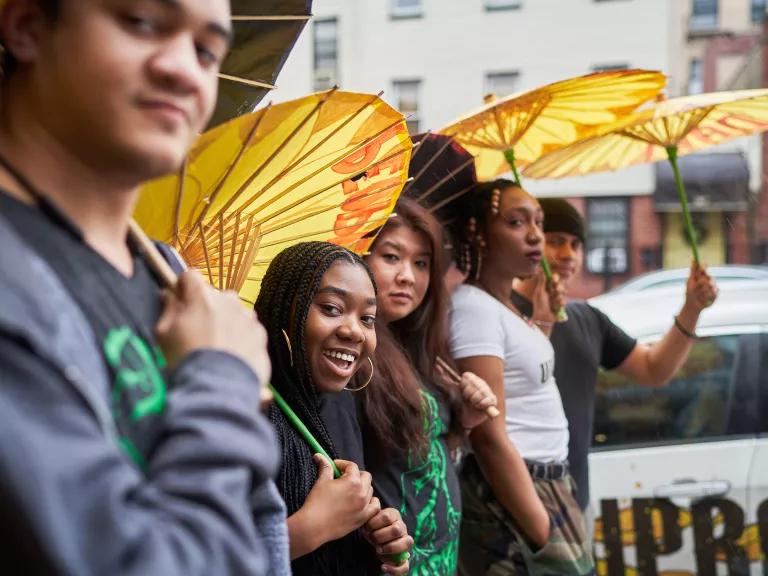
UPROSE youth members
Michael Rubenstein for NRDC
After her initial meeting with Yeampierre more than 20 years ago, the teenager returned to UPROSE with a crew of other passionate young people in tow. Though her group had little funding and just a few staff members at the time, Yeampierre took them under her wing. It was a natural thing for the former civil rights lawyer to do—her own mother had encouraged her studies when she was a girl and helped her become the first in her family to go to college. As the local teens trained under Yeampierre to become organizers, they helped transform UPROSE more fully into an organization focused on environmental justice, and one now thriving under what Yeampierre calls an “intergenerational” leadership structure.
“They were really the core, the backbone, of the organizing effort against the expansion of the Gowanus Expressway, against the siting of a 520-megawatt power plant, and for legislation to protect young people from lead paint exposure,” Yeampierre says, listing several of UPROSE’s major victories.
At the time of the lead paint win, in the late 1990s, UPROSE’s office was one block from the highly trafficked Gowanus Expressway, a major elevated highway through Brooklyn that spews fine particulate matter on the neighborhoods below. An expansion plan would have exacerbated the problem, but UPROSE and other community groups brought the plan to a halt.
Several years later, UPROSE and Sunset Park residents successfully blocked a pre-application from Sunset Energy Fleet to build an electricity-generating barge off a nearby low-income community of color. (At the time, the neighborhood already hosted two barge power plants, and today three natural gas power plants operate within a 10- to 15-block radius.)
Over the past decade or so, climate justice—which addresses the increasingly urgent need for climate action in vulnerable communities that are also fighting against racial and economic discrimination—has become a priority for UPROSE. In the wake of 2012’s Superstorm Sandy and at the urging of a community devastated by its impacts, UPROSE launched the Sunset Park Climate Justice Center, New York City’s first grassroots-led climate adaptation and community resilience planning project.
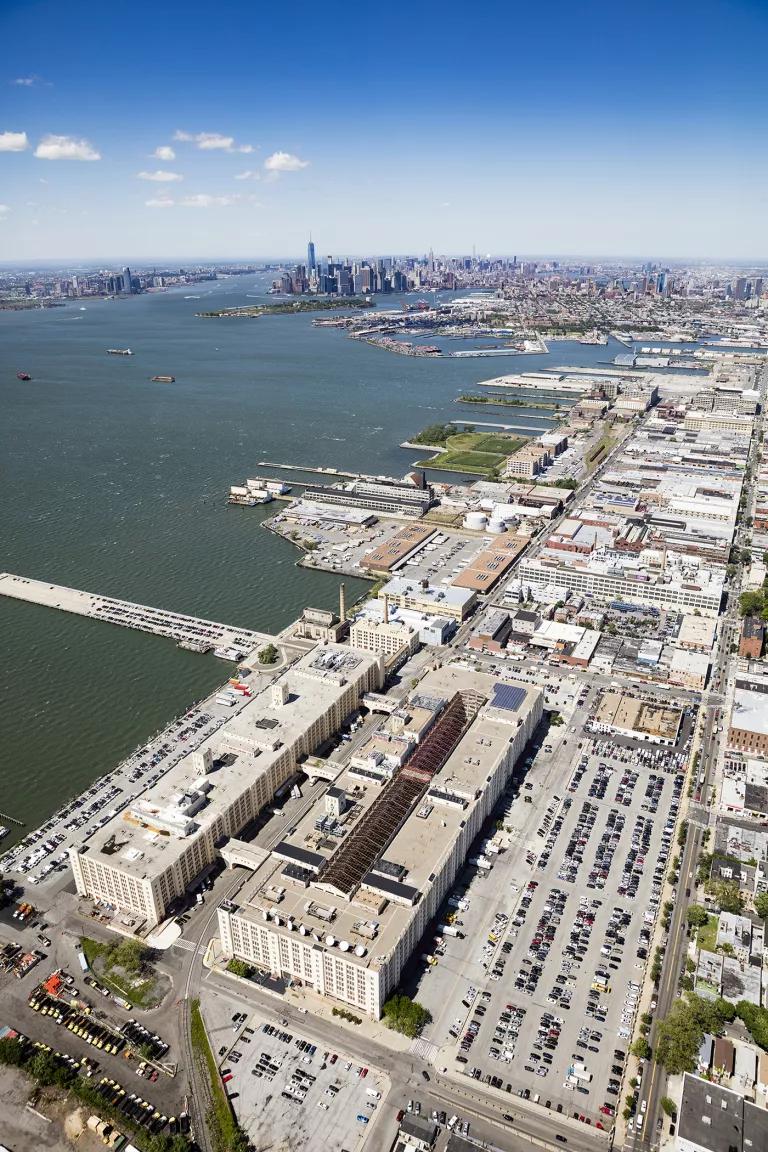
A view of the rooftop of the Brooklyn Army Terminal where solar panels will be placed
NYCEDC
The center’s latest initiative is New York State’s first community-owned solar cooperative, which will take root on the roof of the Brooklyn Army Terminal, a network of warehouses and other buildings used as a manufacturing hub and home to a NYC Ferry stop. The cooperative will be owned and governed by local residents and will be operated to ensure that members’ energy prices remain affordable. This is sorely needed in a neighborhood where 29 percent of residents live below the poverty line and typically devote a disproportionate chunk of their income (around 10 percent) to energy costs.
In addition to working to bring clean energy to its neighborhood, UPROSE is also fighting against Sunset Park’s legacy of dirty energy. Through an amicus brief filed last November with two other New York City–based environmental justice groups—THE POINT Community Development Corporation and the New York City Environmental Justice Alliance, which counts the other two as members—UPROSE joined a lawsuit that New York City brought against the world’s five largest investor-owned fossil fuel producers. In the lawsuit, the city seeks compensation from the companies for the harm it has suffered, and will continue to endure, as a result of their activities. The city says that these companies are knowingly putting their profits before the health of New York City residents and the planet.
“We make the case in our brief that while climate change is a phenomenon that affects the entire planet, it affects New York City uniquely and particularly in that its residents experience more extreme heat and more extreme flooding,” says Kimberly Ong, a senior attorney at NRDC who co-leads the organization’s Northeast Fossil Free Team. “And we further go on to explain that low-income people and people of color within New York City are even more disproportionately harmed by the effects of climate change,” with fewer resources to both prevent and recover from the impacts of extreme weather events.
The case is part of a larger wave of similar lawsuits across the country. Municipalities and other groups are trying to hold those most responsible for climate change accountable for their behavior, just as tobacco companies have faced legal consequences for the health impacts of cigarettes, Ong says.
Yeampierre sees the lawsuit as just one of many innovative tactics necessary to achieve a just transition away from an economy based on fossil fuel extraction and toward climate solutions that value the leadership of frontline communities like Sunset Park. “This is a time when we have to be really creative about trying different kinds of approaches to address a crisis that none of us has ever faced, and it has to be done with a lot of humility,” she says.
In some ways, the impacts of the climate crisis are nothing new for New Yorkers like Yeampierre. As a child, she witnessed both of her parents suffering from asthma while living in Harlem, the South Bronx, and Washington Heights, and she recently had a bilateral pulmonary embolism. She attributes these respiratory health problems to the disproportionate exposure to sources of air pollution that vulnerable communities like hers face across America. “Understanding that environmental injustice really was connected to our ability to breathe and that it was really threatening our lives was very personal,” she says of UPROSE’s awakening to climate justice.
That understanding appears to be innate to the many young people who have joined—and remained devoted to—the organization over the years. Joaquin Brito Jr., for example, started working there when he was 14. After leaving New York City for college, then graduate school at Cornell, he now sits on the Board of Directors. Recently Brito testified in support of strengthening the city’s waste equity policies, to cut the amount of garbage trucked in and dumped in overburdened neighborhoods like his. Community advocates had lobbied for waste equity for years, and legislation was finally signed by Mayor Bill de Blasio last August.
Staffer Ting Ting Fu, who was born in China and raised in Sunset Park, started as a summer intern at 13. She quickly became one of UPROSE’s youth organizers, working on community outreach, and she returned to the organization to be a climate justice organizer after college. In her current role, Fu teaches Sunset Park residents about climate adaptation and resilience, facilitates youth teach-ins, and supports UPROSE’s Real Roots campaign, a youth-led initiative focusing on the environmental and health impacts of personal care products popular in low-income communities of color.
“She understands a lot of complicated things that only come from being really meaningfully engaged in an organization over time and having a real opportunity to exercise leadership,” Yeampierre says.
Yeampierre and her staff at UPROSE have made huge strides toward improving the health of the neighborhood and ensuring its continued vibrancy. For example, the organization helped secure New York State’s largest brownfield remediation grant—and in doing so doubled the amount of open space in Sunset Park. The group successfully fought to bring back a bus route that the city had removed from the community, expanded a median to create more walkability, and facilitated a community-led design of a greenway to connect the neighborhood to the waterfront.
“For some folks this is something academic, but for us this is literally connected to our survival. So we got good at it,” Yeampierre says of the organization’s numerous victories.
“People always wonder how you keep communities engaged over time,” she continues. “You’ve got to have little gains that keep them going. Because when people have two or three jobs, they’ve got big families, they’re struggling to make a living, the last thing they want to do is come to a meeting. But if they’re involved in something that’s going to make a difference in their lives and their kids are going to breathe better and are going to be healthier, they will engage.”
This NRDC.org story is available for online republication by news media outlets or nonprofits under these conditions: The writer(s) must be credited with a byline; you must note prominently that the story was originally published by NRDC.org and link to the original; the story cannot be edited (beyond simple things such as grammar); you can’t resell the story in any form or grant republishing rights to other outlets; you can’t republish our material wholesale or automatically—you need to select stories individually; you can’t republish the photos or graphics on our site without specific permission; you should drop us a note to let us know when you’ve used one of our stories.


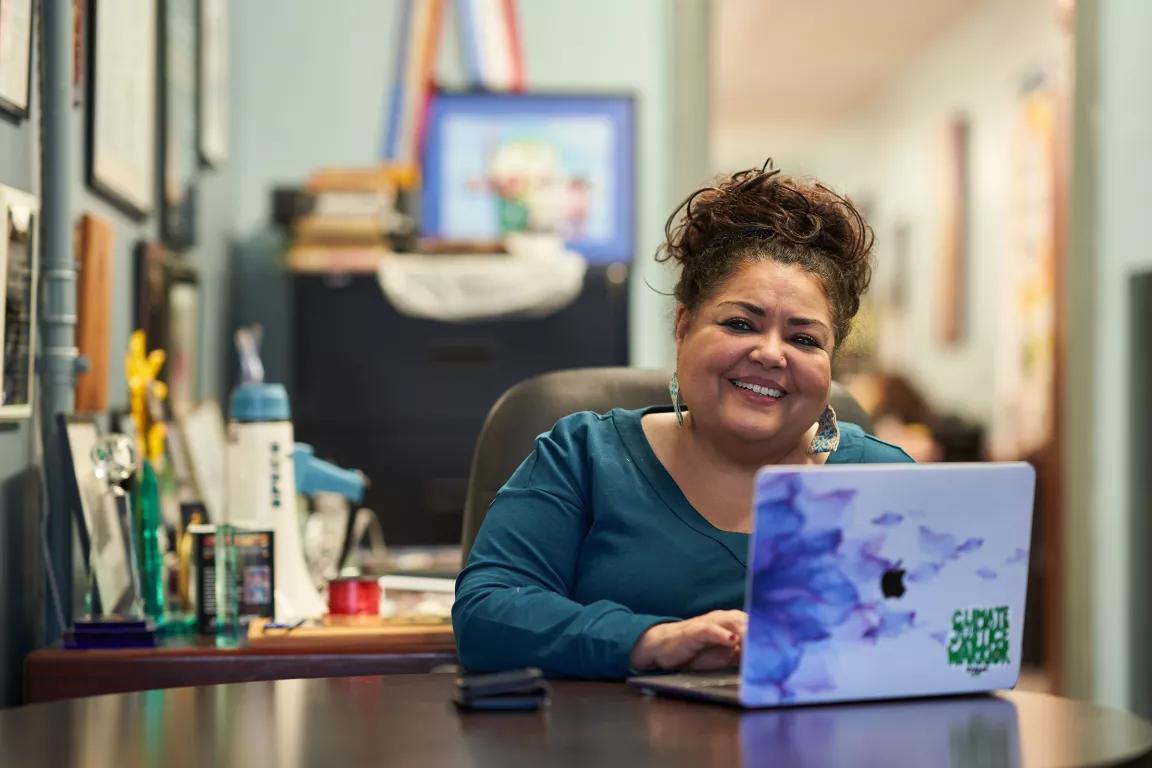
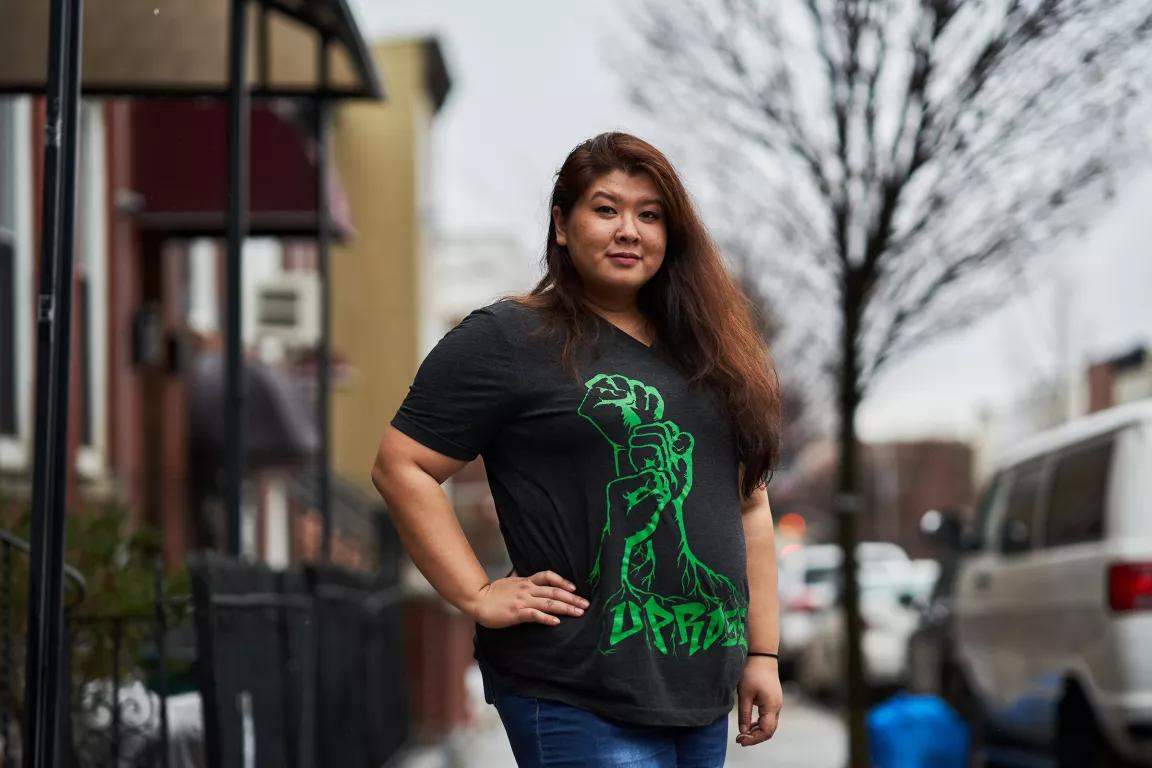
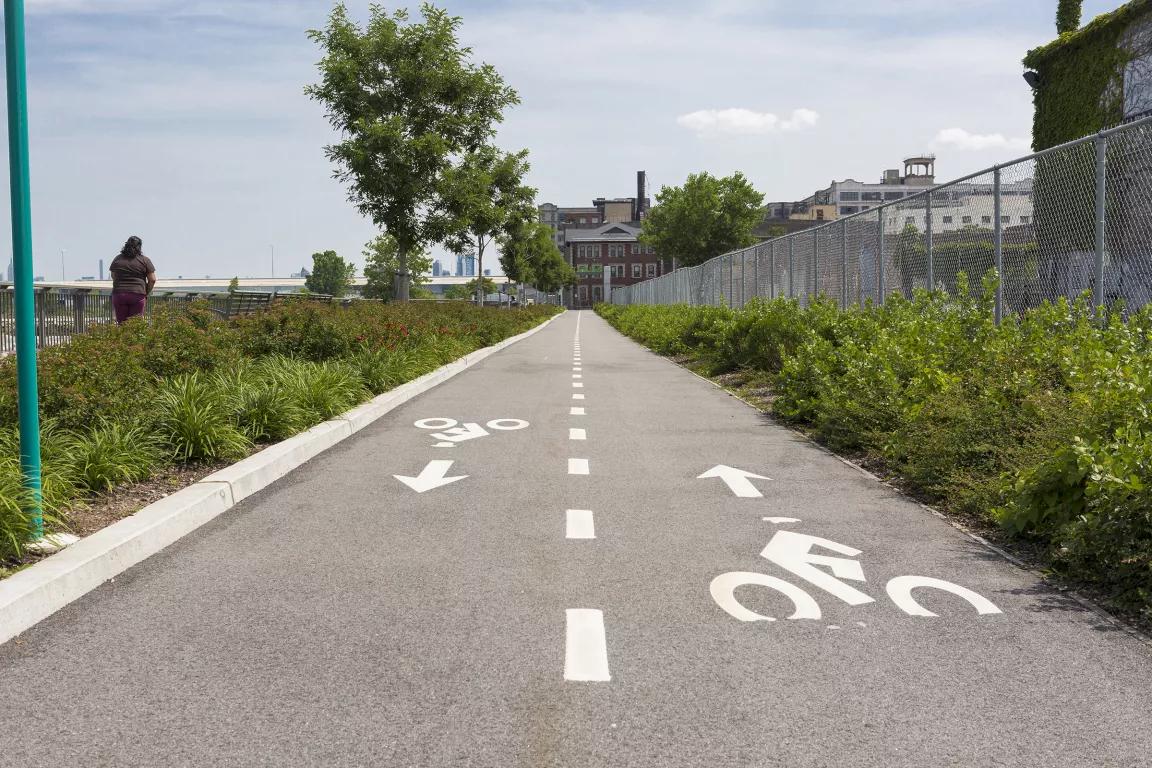
What Is Congestion Pricing?
A New York Climate Justice Activist with Roots in the Blue Ridge Mountains
The Story of Colonialism and Climate Change Told Through Centuries of Indigenous Artworks